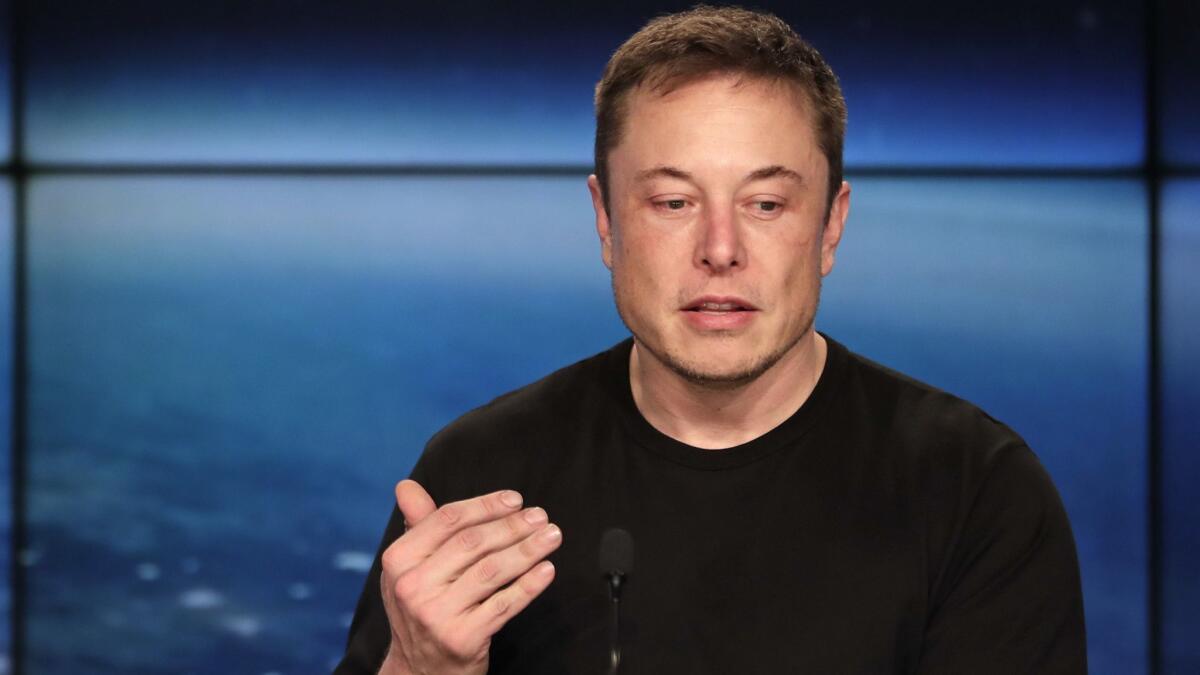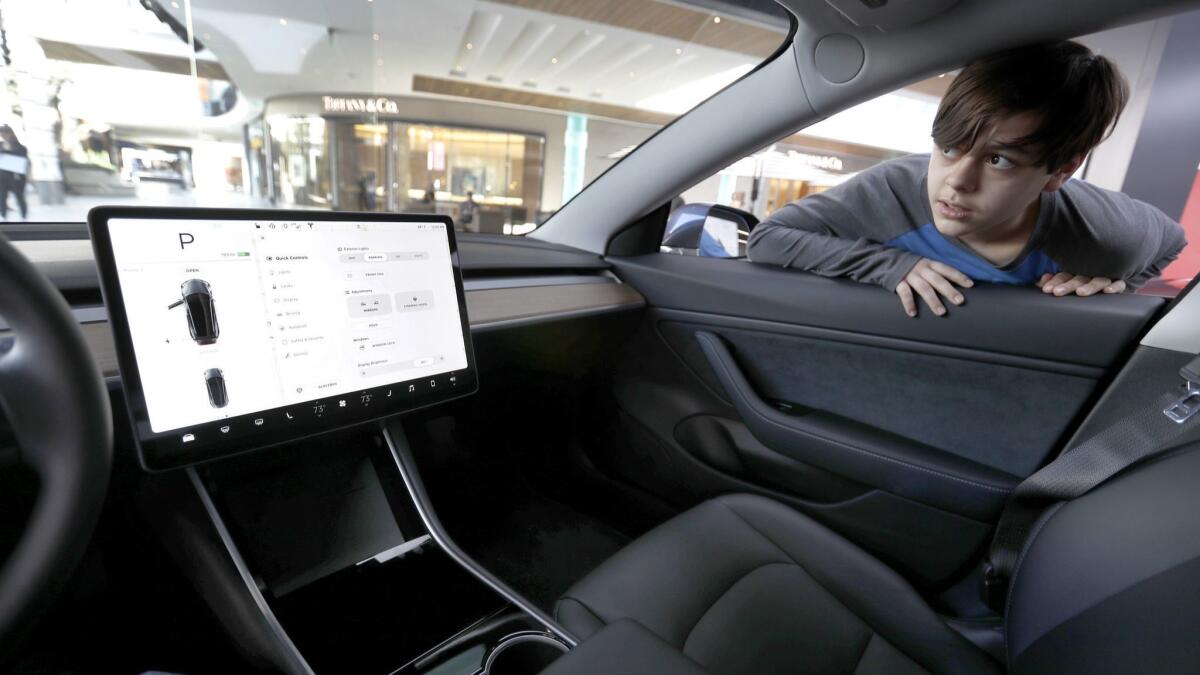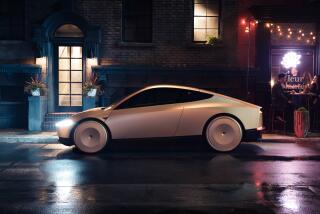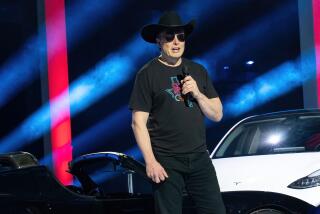Tesla’s stock tumbles a day after Elon Musk’s testy earnings call, poor financial results

Reporting from San Francisco — Tesla Inc.’s stock tumbled in early trading Thursday after the company reported abysmal first-quarter financial results and Chief Executive Elon Musk grew irritated with Wall Street analysts during a conference call to discuss the results.
The stock plummeted 6.1% to $282.02 a share in early trading.
The hyper-ambitious electric-vehicle and renewable-energy company, which is struggling to fix production problems on its make-it-or-break-it Model 3 electric sedan, reported a net loss Wednesday of $784.6 million, slightly deeper than the $770.8 million loss it registered in the previous quarter and up substantially from the $397 million it lost in the same period last year.
More alarming, the company’s cash drain — as measured by free cash flow — increased dramatically, to a little more than $1 billion, from $276.8 million in the previous quarter.
Cash on hand dropped to $2.7 billion, down from $3.4 billion at the end of 2017.
Still, the company continues to think big. In the conference call with analysts, Musk said, “We expect to announce a gigafactory in China soon.” He offered no details but did note that the Chinese government is talking about reducing or removing the requirement that foreign automobile manufacturers in China must enter a 50-50 joint venture with a Chinese company.
The call included some strange interactions. Musk cut off two analysts, labeling their inquiries “boring” and “dry.”
Toni Sacconaghi of Sanford C. Bernstein asked about capital requirements. “Boring,” Musk said. “Boneheaded questions are not cool.”
After Joe Spak of RBC Capital Markets asked how many Model 3 reservation holders actually ordered the car when they had the chance, Musk said, “Sorry these questions are so dry. They’re killing me.”
In its earnings report, Tesla backtracked from its promise to burst-build 6,000 Model 3s a week by the end of June. Now, the company says, it will “produce approximately 5,000 cars a week in about two months.” Tesla also said to expect more shutdowns of the Model 3 line in coming months to “address bottlenecks” and “increase production to new levels.”
Not all the numbers were negative. Automotive revenue was up 1.2%, to $2.7 billion, in the first quarter, nudged up by delivery of 8,180 Model 3s, which carried a base price of $50,000 before options and government incentives. Plans to offer a $36,000 model are on hold.
Nevertheless, big questions remain: Will Tesla need to tap the capital markets for more cash this year, and, if so, will it be able to? Musk has said Tesla doesn’t need to raise debt or equity this year. But the bond-rating firm Moody’s, which downgraded Tesla bonds in March, said the company will need a $2-billion cash infusion before the year is out.
Wednesday, the company said it would reduce capital spending this year to $3 billion, from $3.4 billion.

For the last couple of years, Musk had led investors to expect the Model 3 to reach an annual production rate of about 400,000 cars by the end of 2017. Instead, the company is struggling to hit an annual rate of 120,000. In the Wednesday report, Tesla said Model 3 production hit 2,270 cars a week in April “for the 3rd straight week over 2,000.” Currently, Tesla’s Model S and Model X, both priced near $100,000 with options, are the company’s main products. The company forecasts flat unit sales this year at about 100,000.
Right now, though, Musk is in Model 3 repair mode.
In 2016, when he was setting his bold production targets, Musk also pledged to revolutionize manufacturing, with plants so highly automated they’d look like science fiction alien spacecraft compared with the factories run by other automakers today. Tesla’s goal, he said, was to become the best manufacturing company on Earth.
Just last month, though, Musk acknowledged on the “CBS This Morning” TV show that he’d overstuffed the Model 3 line with automation. He confessed that “I need to figure out how to be better” so Tesla could get better at building cars.
He then shut down the Model 3 line for a week to “improve automation and systemically address bottlenecks in order to increase production rates,” as a company spokesman put it.
On the conference call with analysts Wednesday, Musk said he has a handle on Model 3 production problems.
“These are quite manageable,” he said. “It’s not like huge brain surgery to get these things right. It’s a lot of time and hard work.”
Most of the issues are software related, he said, and “Tesla is way better at software than any other company. If the problem is software, we are in a good position.”
He admitted that some approaches to automation were ill conceived. He highlighted a “ridiculous” attempt to use a vision system and robot arm to install fiberglass mats on top of battery packs.
The mats are “basically fluff,” he said. “The fluffer-bot would fail to pick up the fluff.… Hands are way better at that.”
Musk remains confident that Tesla is on the verge of emerging as a manufacturing dynamo. Asked about the upcoming Model Y crossover, he said: “I think Model Y is going to be a manufacturing revolution. I think it will be incredible from a manufacturing standpoint because we do not want to go through this pain again.” He said production of the car will probably begin in 2020.
Meantime, Musk is grappling with a host of other problems.
Top executives continue to quit. The latest is George Eli, who ran Tesla’s Western Europe operations. In April, Autopilot head Jim Keller departed for Intel. In March, chief accounting officer Eric Branderiz left after less than two years on the job. In February, global sales and service head Jon McNeill announced his departure.
The company’s plan for a full driverless system has been delayed. A coast-to-coast road trip set for 2017, intended to demonstrate the system’s upcoming autonomous mode, is on indefinite hold. (Some Model 3 drivers are paying an extra $3,000 for fully driverless software without knowing when Tesla might have it ready.)
Musk has said patchy state regulations are getting in the way of a major rollout. “From a technical standpoint, (fully autonomous Autopilot) probably will be ready by end of next year.”
The world is still waiting for a wide scale rollout of the solar-tile roof that Musk spotlighted at a well-publicized event held on the Universal Studios Hollywood backlot in October 2016.
Twitter: @russ1mitchell
UPDATES:
May 3, 7:05 a.m.: This article was updated with the stock’s drop in early trading Thursday.
9:55 p.m.: This article was updated with quotes from Musk’s interactions with analysts on a conference call.
4 p.m.: This article was updated with Musk’s comments from the analyst call and stock prices.
This article was originally published on May 2 at 2:35 p.m.







